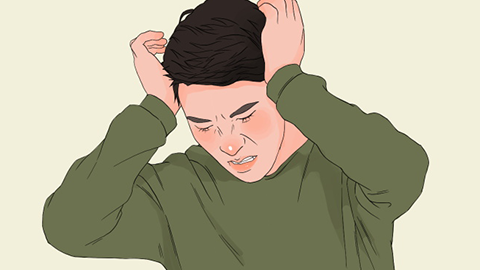What should I do if toothache causes headache?
Generally, headaches caused by tooth pain may be due to improper tooth occlusion, thermal stimulation (hot or cold), shallow caries, pulpitis, pericoronitis of wisdom teeth, and other reasons. It is recommended to seek medical attention promptly, identify the underlying cause, and improve symptoms under a doctor's guidance through general management, medication, surgical treatment, etc. Specific analyses are as follows:

1. Improper tooth occlusion: Long-term unilateral chewing or abnormal occlusal relationship can lead to uneven force distribution on teeth. During chewing, surrounding nerves may be stretched, causing tooth pain that radiates to the head. Adjust chewing habits by avoiding one-sided chewing and chew food slowly and thoroughly. If occlusal abnormalities are significant, orthodontic appliances may be required to correct the bite and reduce dental stress.
2. Thermal stimulation of teeth: When tooth enamel is damaged and dentin becomes exposed, hot or cold foods and beverages can stimulate nerve endings within the dentinal tubules, triggering tooth pain that may refer to the head. Avoid extremely cold or hot foods; opt for lukewarm or cool diets. Use fluoride-containing anti-sensitivity toothpaste to strengthen teeth and improve resistance to sensitivity.
3. Shallow caries: Bacterial erosion of tooth enamel leads to shallow cavities. These cavities may irritate the dental pulp nerve, causing dull or mild toothache that can radiate to the head. Typically, there is no spontaneous pain. Patients should follow medical advice to apply medications such as 75% sodium fluoride glycerin paste, 8% stannous fluoride solution, or acidic phosphate fluoride gel to the affected area to promote remineralization of enamel.
4. Pulpitis: Untreated shallow caries may progress to pulpitis. Inflamed and swollen pulp tissue compresses nerves, resulting in severe tooth pain that radiates to the same side of the head or face. Root canal treatment should be performed promptly to remove infected tissue from the pulp chamber, eliminate inflammation, and relieve pain.
5. Pericoronitis of wisdom teeth: When a wisdom tooth erupts partially, a blind pocket forms around the crown, allowing food debris to accumulate and trigger inflammation. This inflammatory process causes tooth pain that may spread to the head or throat. Patients should follow medical advice to take medications such as metronidazole tablets, amoxicillin capsules, or ibuprofen sustained-release capsules.
Maintain good oral hygiene in daily life—brush teeth twice daily, rinse after meals, and have regular dental checkups to detect and address dental issues early. Reduce intake of sweets and spicy foods, avoid chewing with painful teeth, and adopt comprehensive oral care measures to alleviate both tooth pain and associated headaches, thereby maintaining oral health.





